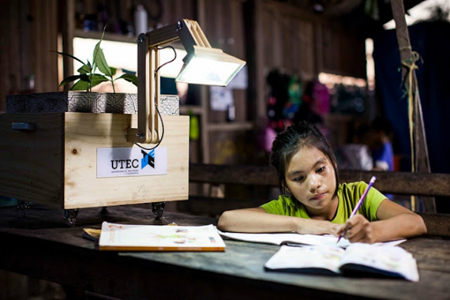
- A-
- A
- A+
UTEC Develops LED Lamp Powered by Plant Growth
Stimulated by a real-world problem, the shortage of electric energy in remote areas of Peru and particularly in rural areas of the tropical forest, the Universidad de Ingeniería y Tecnología (UTEC), through a team of researchers - made up of teachers and eight students – developed a Plant lamp, an innovative alternative renewable energy generating system.
The Plant lamp developed by UTEC is capable of supplying two hours of light per day through a low energy consumption, high illumination LED lamp. The system operates with the energy stored in the soil containing nutrients and/or microorganisms released by plants during their growth and this enables us to use the free electrons from the microorganisms and in this way feed the lamp.
“We put the plant and soil into a wooden plant pot together with a previously established and properly protected irrigation system. Then, inside the pot we place the energy generation system that we created which stores soil and electrodes capable of converting plant nutrients into electric energy” explains Elmer Ramirez, a professor of Energy and Power Engineering at UTEC and leader of the Plant lamp research team.
The beneficiaries of this project initiative are the population of the native community of Nuevo Saposa, which pertains to the ethnic group called the Shipibo Conibo, in Ucayali, a region which is noted for having the lowest rate of access to electricity. “While there are shortages of a number of resources in Nuevo Saposoa, the absence of electric energy has a major impact on its social, educational and family development”, says Jessica Ruas, UTEC Marketing Director, who also points out that 10 prototypes of the Plant lamp have been delivered to families of this community.
Meanwhile, Elmer Ramirez, explained that Nuevo Saposoa possesses an environment surrounded by vast amounts of vegetation which is rich in flora, which facilitates the creation of a solution of this nature. “We made proper use of the Amazon region’s own natural resources such as the soil and plants, in harmony with the environment without any impact whatsoever on the forest, he noted.
For UTEC, the creation of the Plant lamp arose from the impulse to demonstrate once again that society’s problems can be solved through engineering. This new initiative combines creativity, research, innovation and development with a close look at the geographical setting and the environment. “We are positive that this will result in a better quality of life for community families because by using the Plantalámpara, they will have access to renewable energy to provide light to their homes for use by the children during their school work study hours or during work hours to produce and sell their products and with this, contribute to the self-sustainability of the population, Ruas says.
Similar News
Links



 Elm TV
Elm TV
 Photo
Photo
 Video
Video





